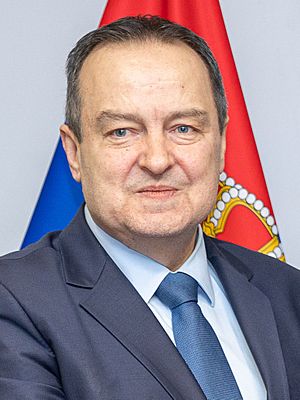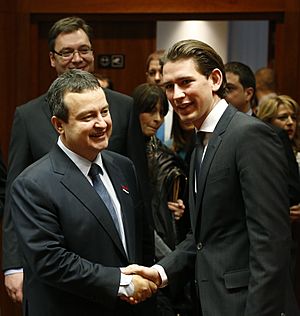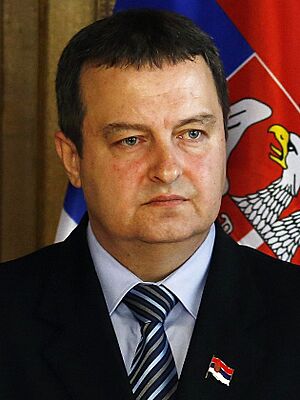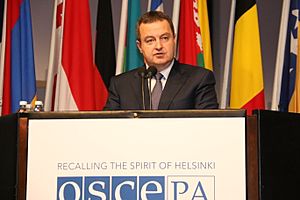Ivica Dačić facts for kids
Quick facts for kids
Ivica Dačić
|
|
|---|---|
|
Ивица Дачић
|
|

Dačić in 2023
|
|
| Minister of Internal Affairs | |
| Assumed office 2 May 2024 |
|
| Prime Minister | Miloš Vučević Đuro Macut |
| Preceded by | Bratislav Gašić |
| In office 7 July 2008 – 27 April 2014 |
|
| Prime Minister | Mirko Cvetković Himself |
| Preceded by | Mirjana Orašanin (acting) |
| Succeeded by | Nebojša Stefanović |
| Deputy Prime Minister of Serbia | |
| Assumed office 26 October 2022 |
|
| Prime Minister | Ana Brnabić Himself (acting) Miloš Vučević Đuro Macut |
| Preceded by | Branko Ružić |
| In office 27 April 2014 – 22 October 2020 |
|
| Prime Minister | Aleksandar Vučić Himself (acting) Ana Brnabić |
| Preceded by | Aleksandar Vučić |
| Succeeded by | Branko Ružić |
| In office 7 July 2008 – 27 July 2012 |
|
| Prime Minister | Mirko Cvetković |
| Preceded by | Božidar Đelić |
| Succeeded by | Aleksandar Vučić |
| Prime Minister of Serbia | |
| Acting 6 February 2024 – 2 May 2024 |
|
| President | Aleksandar Vučić |
| Preceded by | Ana Brnabić |
| Succeeded by | Miloš Vučević |
| Acting 31 May 2017 – 29 June 2017 |
|
| President | Aleksandar Vučić |
| Preceded by | Aleksandar Vučić |
| Succeeded by | Ana Brnabić |
| In office 27 July 2012 – 27 April 2014 |
|
| President | Tomislav Nikolić |
| Deputy | Aleksandar Vučić (first) Jovan Krkobabić Rasim Ljajić Suzana Grubješić |
| Preceded by | Mirko Cvetković |
| Succeeded by | Aleksandar Vučić |
| Minister of Foreign Affairs | |
| In office 26 October 2022 – 2 May 2024 |
|
| Prime Minister | Ana Brnabić |
| Preceded by | Nikola Selaković |
| Succeeded by | Marko Đurić |
| In office 27 April 2014 – 22 October 2020 |
|
| Prime Minister | Aleksandar Vučić Himself (acting) Ana Brnabić |
| Preceded by | Ivan Mrkić |
| Succeeded by | Ana Brnabić (acting) Nikola Selaković |
| President of the National Assembly of Serbia | |
| In office 22 October 2020 – 1 August 2022 |
|
| Preceded by | Smilja Tišma (acting) Maja Gojković |
| Succeeded by | Vladeta Janković (acting) Vladimir Orlić |
| Minister of Information | |
| In office 24 October 2000 – 25 January 2001 Served with Bogoljub Pejčić and Biserka Matić-Spasojević |
|
| Prime Minister | Milomir Minić |
| Preceded by | Aleksandar Vučić |
| Succeeded by | Office abolished |
| Personal details | |
| Born | 1 January 1966 Prizren, SR Serbia, SFR Yugoslavia (present-day Prizren, Kosovo) |
| Political party | SPS |
| Spouse | Sanja Djaković Dačić |
| Children | 2 |
| Alma mater | University of Belgrade |
| Signature |  |
Ivica Dačić (born 1 January 1966) is a Serbian politician. He has been the leader of the Socialist Party of Serbia (SPS) since 2006. He currently serves as the Deputy Prime Minister of Serbia and the Minister of Internal Affairs.
Dačić studied at the University of Belgrade. He joined the SPS party in 1991. He quickly became important in the party, serving as its spokesman from 1992. After a big change in government in 2000, he was the Minister of Information for a short time.
He became the leader of the SPS party in 2006. Dačić has worked to change and update the party. In 2008, he helped form a government with the Democratic Party. He then became the first Deputy Prime Minister and Minister of Internal Affairs until 2012. This government helped Serbia get closer to joining the European Union.
After the 2012 elections, Dačić became the Prime Minister of Serbia. His government worked to start official talks for Serbia to join the European Union. He also signed an important agreement about relations between Serbia and Kosovo. From 2014 to 2020, he was again the first Deputy Prime Minister and also the Minister of Foreign Affairs. He was later elected as the President of the National Assembly.
Contents
Early Life and Education
Ivica Dačić was born on 1 January 1966 in Prizren. At that time, Prizren was part of Yugoslavia. He grew up in a Serbian family in a town called Žitorađa. His father, Desimir, was a police officer, and his mother, Jelisaveta, was a homemaker.
When he was very young, Ivica was known for being smart. He could read and write by himself at age five. He knew many facts about geography and sports. His classmates remembered him as intelligent and witty. He also played handball and football.
He went to high school in Niš and got excellent grades. In 1989, he graduated from the University of Belgrade's Faculty of Political Sciences with a degree in journalism. He was a top student and even won an award for his academic achievements.
Political Journey
Starting in Politics
In the early 1990s, Ivica Dačić worked as an editor for a newspaper of the Socialist Party of Serbia (SPS). He officially joined the SPS in 1991. He quickly became a key person in the party. He led the information and propaganda efforts for the SPS during elections in 1992 and 1993.
He also served as a minister in the first assembly of the Federal Republic of Yugoslavia. From 1992 to 2000, he was the spokesman for the SPS for eight years.
Leading the Party
After a major political change in Serbia in October 2000, Ivica Dačić became the co-minister of Information. He worked to update the SPS party. He brought in younger, more modern members while keeping some older figures.
In 2003, he became the President of the Main Board of the SPS. He was also a deputy in the parliament. In 2004, he ran for president of Serbia, finishing fifth.
On 4 December 2006, Ivica Dačić was elected President of the Socialist Party. He won against another candidate in a vote by party members. In 2008, the SPS party joined a new government with the Democratic Party. This brought the Socialists back into power. Dačić supported Serbia's goal of joining the European Union.
Becoming Prime Minister
In the 2012 parliamentary election, the Socialist Party's group came in third place. After weeks of discussions, the Socialist Party decided to form a government with the Serbian Progressive Party (SNS). The leader of the SNS, Tomislav Nikolić, offered Dačić the role of Prime Minister.
Ivica Dačić officially became Prime Minister on 27 July 2012. He said that his government would focus on improving the economy and helping Serbia join the European Union. He also mentioned that his party had learned from past mistakes.
Key Policies and International Relations
Working with Other Countries

As Prime Minister, Dačić said that Serbia would work well with all countries. He wanted to promote safety, stability, and good relationships in the Western Balkans region.
Serbia and the European Union

Serbia had already become a candidate to join the European Union before Dačić became Prime Minister. Dačić promised that his new government would continue these efforts. His supporters point to his role in helping Serbian citizens travel without visas in the EU as proof of his pro-EU stance.
In June 2013, the European Union confirmed that official talks for Serbia to join the EU could begin. Dačić said that his government would work very hard to complete these talks quickly. He believed that matching Serbia's laws with European laws would help bring more investments and jobs.
The Status of Kosovo

In 2008, the Assembly of Kosovo declared independence. Serbia did not agree with this declaration.
When Dačić first became party leader in 2006, he said he would fight for Kosovo. However, his views changed over time. In February 2013, he met with Hashim Thaçi, the Prime Minister of Kosovo, for important talks. In April 2013, Dačić and his government took steps to improve relations between Kosovo and Serbia. He stated that while Serbia would not recognize Kosovo's independence, it was important to define Serbia's "real borders."
Economy and Finance
When he became Prime Minister, Dačić faced challenges with Serbia's economy. He said that creating jobs and helping the economy recover were the government's top goals. He also mentioned that he would form a special council to focus on economic recovery.
Personal Life
Ivica Dačić is married to Sanja Djaković Dačić. They have two children, a son named Luka and a daughter named Andrea.
He was once the Vice-President of the Olympic Committee of FR Yugoslavia. He also served as the President of the RK Partizan handball club.
Awards and Recognition
- In 2009, he received the "Najevropljanin" (Best European) award for his work on Serbia's European integration.
- He was recognized by the Sports Association of Serbia in 2011 for his contributions to sports in the country.
- In 2012, he received the "Golden Sign of the Police of Republika Srpska" for cooperation between the Serbian Police and the Republika Srpska Police.
- He also received the Order of the Republika Srpska.
Images for kids
See also
 In Spanish: Ivica Dačić para niños
In Spanish: Ivica Dačić para niños
 | William L. Dawson |
 | W. E. B. Du Bois |
 | Harry Belafonte |





